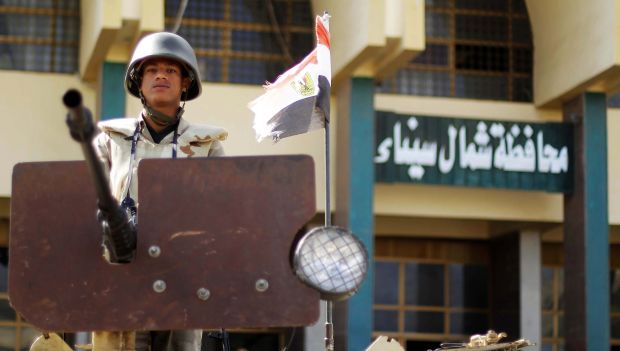
An Egyptian soldier keeps watch atop an armored vehicle next to the North Sinai Government building during celebrations on the 40th anniversary of the 1973 Arab-Israeli war in El-Arish, North Sinai, Egypt, 06 October 2013. (EPA)
El-Arish, Egypt, AP—An attack on an army post in the restive northern part of Egypt’s Sinai Peninsula caused a large explosion and killed 25 people, according to security and medical officials, making it one of the deadliest attacks on security forces since violence spiked following the ouster of Islamist president Mohamed Mursi last year.
Two senior military officials said earlier that a suicide bomber had rammed his vehicle into the checkpoint. But a top official in El-Arish, where the bombing took place, said the checkpoint was struck by a mortar round and rocket-propelled grenades, which hit a tank carrying explosives and ammunition, causing a secondary explosion.
A fourth official confirmed that account but said a suicide bomber also targeted the post. Conflicting accounts are common in the chaotic aftermath of such incidents.
The officials said the death toll is expected to rise because nearly 20 people were wounded and several were in critical condition. The officials spoke on condition of anonymity because they were not authorized to talk to media.
Egypt’s President Abdel Fattah El Sisi, a former defense minister and army chief, held an emergency meeting of the National Defense Council following the attack.
Islamic militants have been battling security forces in the Sinai for a decade, but the violence spiked after the military overthrew Islamist President Mohammed Mursi in July 2013 amid massive protests demanding his resignation. The attacks have also spread to other parts of Egypt, with militants targeting police in Cairo and the Nile Delta.
The government has blamed the violence on Mursi’s Muslim Brotherhood group and launched a sweeping crackdown against his supporters, killing hundreds in street clashes and jailing some 20,000 people.
The Brotherhood officially renounced violence decades ago and has denied involvement in the recent attacks, saying it is committed to peaceful protests demanding Mursi’s reinstatement.
Most of the major attacks have been claimed by Ansar Bayt Al-Maqdis, an Al-Qaeda-inspired group based in Sinai.
All the cities in northern Sinai have been without police since the 2011 uprising that toppled longtime autocrat Hosni Mubarak. During the turmoil, militants swept through several towns, attacking stations and killing a number of police.
